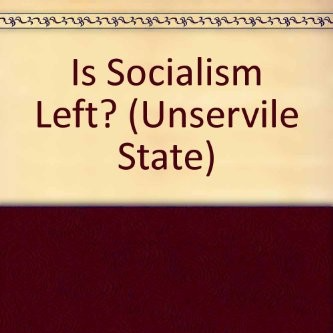From the Archive: Is Socialism Left?

This is an opinion piece written by William Francis, a member of the Radical Association’s board. It was first published on 15th August 2025.
With the seeming re-emergence of state socialism as a political doctrine on the left of UK politics (such as embodied by Zack Polanski of the Greens or by Jeremy Corbyn and Zarah Sultana of the left-wing [placeholder] party, we take a fresh look at historic left-wing Liberal arguments against the dangers of state socialism.
George Watson’s 1967 pamphlet Is Socialism Left? comes from an often-overlooked Liberal discourse of challenging the left-wing credentials of Socialism.
Indeed, ten years prior in a Chapter in The Unservile State (which Watson himself edited), Elliot Dodds argued that (state) socialist obsession with economic planning made them supporters of a de facto aristocratic society, in contrast to the “concern for opportunity for the individual person”, and previous defined left-wing thought.
Watson’s pamphlet expands upon this argument and argues that Socialism is inextricably tied to violence, gross inequality, and censorship. For a 21st-century reader, these pronouncements seem somewhat dated. Watson’s evidence for most of these claims comes from practices of the Stalinist USSR and Titoist Yugoslavia, as well as “the founder-prophets of British Socialism”, many of whom were eugenicists.
However, the pamphlet does provide some guidance in the contemporary democratic world. Watson reminds us that social welfare provision was erroneously called socialism in 1960s (a problem that endures in the present), noting that “It is remarkable how many people believe that social reform in Britain only began in earnest with the election of a Labour Government in 1945”. He argues that Bismarck’s and Chiang Kai-shek’s social welfare legislation should dissuade anyone of this notion and encourages Liberals to highlight the role of the Bannerman and Asquith governments in establishing the welfare state.
His most significant argument for the contemporary reader is on inequality that is manifested in economic planning between the planner and the planned. Though Dodds touched on this in The Unservile State with regard to economic planning in general, Watson focused on the growing powers of central government to interfere with free collective bargaining.
Readers familiar with the 1970s will no doubt be aware that this sort of state socialism led to the winter of discontent, but there are echoes of this in the present. The Labour government’s hostility towards doctors amid industrial action, as well as the Conservative party calling for doctors to be banned from striking (much like it was for all workers east of the Iron Curtain), shows that the inequality between the planner and the planned remains pertinent for Liberals and through grappling with this issue we can appeal to trade unionists on a distinctly liberal platform.
Following the fall of the Berlin Wall, the collapse of the USSR, the emergence of market reforms in the nominally communist world, and the rise of third-way social democracy (as practised by New Labour), Liberal anti-socialism has seemed somewhat antiquated, if not downright reactionary, to many Liberals.
However, in light of Zack Polanski’s seemingly successful campaign for the Green Party’s leadership campaign, and the seismic emergence of the Corbyn-Sultana party, Socialism is back on the British political menu. We Liberals may need to rearticulate the arguments against state socialism.